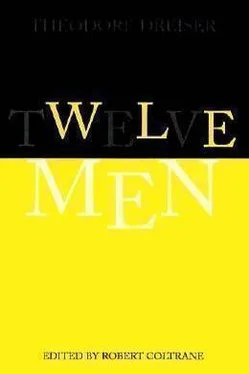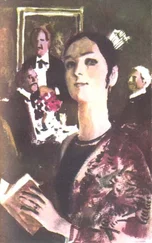Теодор Драйзер - Twelve Men
Здесь есть возможность читать онлайн «Теодор Драйзер - Twelve Men» весь текст электронной книги совершенно бесплатно (целиком полную версию без сокращений). В некоторых случаях можно слушать аудио, скачать через торрент в формате fb2 и присутствует краткое содержание. Год выпуска: 2014, Издательство: epubBooks Classics, Жанр: Биографии и Мемуары, на английском языке. Описание произведения, (предисловие) а так же отзывы посетителей доступны на портале библиотеки ЛибКат.
- Название:Twelve Men
- Автор:
- Издательство:epubBooks Classics
- Жанр:
- Год:2014
- ISBN:нет данных
- Рейтинг книги:4 / 5. Голосов: 1
-
Избранное:Добавить в избранное
- Отзывы:
-
Ваша оценка:
- 80
- 1
- 2
- 3
- 4
- 5
Twelve Men: краткое содержание, описание и аннотация
Предлагаем к чтению аннотацию, описание, краткое содержание или предисловие (зависит от того, что написал сам автор книги «Twelve Men»). Если вы не нашли необходимую информацию о книге — напишите в комментариях, мы постараемся отыскать её.
Twelve Men — читать онлайн бесплатно полную книгу (весь текст) целиком
Ниже представлен текст книги, разбитый по страницам. Система сохранения места последней прочитанной страницы, позволяет с удобством читать онлайн бесплатно книгу «Twelve Men», без необходимости каждый раз заново искать на чём Вы остановились. Поставьте закладку, и сможете в любой момент перейти на страницу, на которой закончили чтение.
Интервал:
Закладка:
Every Wednesday evening for a year thereafter a spectacle of municipal self–consciousness was witnessed, which those who saw it felt sure would redound to the greater strength and popularity of the mayor. In a large hall, devoted to public gatherings, a municipal meeting was held. Every one was invited. The mayor was both host and guest, an individual who chose to explain his conduct and his difficulties and to ask advice. There his constituents gathered, not only to hear but to offer counsel.
"Gentlemen," so ran the gist of his remarks on various of these occasions, "the present week has proved a most trying one. I am confronted by a number of difficult problems, which I will now try to explain to you. In the first place, you know my limitations as to power in the council. But three members now vote for me, and it is only by mutual concessions that we move forward at all."
Then would follow a detailed statement of the difficulties, and a general discussion. The commonest laborer was free to offer his advice. Every question was answered in the broadest spirit of fellowship. An inquiry as to "what to do" frequently brought the most helpful advice. Weak and impossible solutions were met as such, and shown to be what they were. Radicals were assuaged, conservatives urged forward. The whole political situation was so detailed and explained that no intelligent person could leave, it was thought, with a false impression of the mayor's position or intent.
With five thousand or more such associated citizens abroad each day explaining, defending, approving the official conduct of the mayor, because they understood it, no misleading conceptions, it was thought, could arise. Men said that his purpose and current leaning in any matter was always clear. He was thought to be closer to his constituency than any other official within the whole range of the Americas and that there could be nothing but unreasoning partisan opposition to his rule.
After one year of such service a presidential campaign drew near, and the mayor's campaign for reëlection had to be contested at the same time. No gas monopoly evil was now a subject of contention. Streets were clean, contracts fairly executed; the general municipal interests as satisfactorily attended to as could be expected. Only the grade crossing war remained as an issue, and that would require still another vote after this. His record was the only available campaign argument.
On the other side, however, were the two organizations of the locally defeated great parties, and the railroad. The latter, insistent in its bitterness, now organized these two bodies into a powerful opposition. Newspapers were subsidized; the national significance of the campaign magnified; a large number of railroad–hands colonized. When the final weeks of the campaign arrived a bitter contest was waged, and money triumphed. Five thousand four hundred votes were cast for the mayor. Five thousand four hundred and fifty for the opposing candidate, who was of the same party as the successful presidential nominee.
It was a bitter blow, but still one easily borne by the mayor, who was considerable of a philosopher. With simple, undisturbed grace he retired, and three days later applied to one of the principal shoe factories for work at his trade.
"What? You're not looking for a job, are you?" exclaimed the astonished foreman.
"I am," said the mayor.
"You can go to work, all right, but I should think you could get into something better now."
"I suppose I can later," he replied, "when I complete my law studies. Just now I want to do this for a change, to see how things are with the rank and file." And donning the apron he had brought with him he went to work.
It was not long, however, before he was discharged, largely because of partisan influence anxious to drive him out of that region. It was said that this move of seeking a job in so simple a way was a bit of "grand standing"—insincere—that he didn't need to do it, and that he was trying to pile up political capital against the future. A little later a local grocery man of his social faith offered him a position as clerk, and for some odd reason—humanitarian and sectarian, possibly—he accepted this. At any rate, here he labored for a little while. Again many said he was attempting to make political capital out of this simple life in order to further his political interests later, and this possibly, even probably, was true. All men have methods of fighting for that which they believe. So here he worked for a time, while a large number of agencies pro and con continued to denounce or praise him, to ridicule or extol his so–called Jeffersonian simplicity. It was at this time that I encountered him—a tall, spare, capable and interesting individual, who willingly took me into his confidence and explained all that had hitherto befallen him. He was most interesting, really, a figure to commemorate in this fashion.
In one of the rooms of his very humble home—a kind of office or den, in a small house such as any clerk or working–man might occupy—was a collection of clippings, laudatory, inquiring, and abusive, which would have done credit to a candidate for the highest office in the land. One would have judged by the scrap–books and envelopes stuffed to overflowing with long newspaper articles and editorials that had been cut from papers all over the country from Florida to Oregon, that his every movement at this time and earlier was all–essential to the people. Plainly, he had been watched, spied upon, and ignored by one class, while being hailed, praised and invited by another. Magazine editors had called upon him for contributions, journalists from the large cities had sought him out to obtain his actual views, citizens' leagues in various parts of the nation had invited him to come and speak, and yet he was still a very young man in years, not over–intelligent politically or philosophically, the ex–mayor of a small city, and the representative of no great organization of any sort.
In his retirement he was now comforted, if one can be so comforted, by these memories, still fresh in his mind and by the hope possibly for his own future, as well as by a droll humor with which he was wont to select the sharpest and most willful slur upon his unimpeachable conduct as an offering to public curiosity.
"Do you really want to know what people think of me?" he said to me on one occasion. "Well, here's something. Read this." And then he would hand me a bunch of the bitterest attacks possible, attacks which pictured him as a sly and treacherous enemy of the people—or worse yet a bounding anarchistic ignoramus. Personally I could not help admiring his stoic mood. It was superior to that of his detractors. Apparent falsehoods did not anger him. Evident misunderstandings could not, seemingly, disturb him.
"What do you expect?" he once said to me, after I had made a very careful study of his career for a current magazine, which, curiously, was never published. I was trying to get him to admit that he believed that his example might be fruitful of results agreeable to him in the future. I could not conclude that he really agreed with me. "People do not remember; they forget. They remember so long as you are directly before them with something that interests them. That may be a lower gas–rate, or a band that plays good music. People like strong people, and only strong people, characters of that sort—good, bad or indifferent—I've found that out. If a man or a corporation is stronger than I am, comes along and denounces me, or spends more money than I do (or can), buys more beers, makes larger promises, it is 'all day' for me. What has happened in my case is that, for the present, anyhow, I have come up against a strong corporation, stronger than I am. What I now need to do is to go out somewhere and get some more strength in some way, it doesn't matter much how. People are not so much interested in me or you, or your or my ideals in their behalf, as they are in strength, an interesting spectacle. And they are easily deceived. These big fighting corporations with their attorneys and politicians and newspapers make me look weak—puny. So the people forget me. If I could get out, raise one million or five hundred thousand dollars and give the corporations a good drubbing, they would adore me—for awhile. Then I would have to go out and get another five hundred thousand somewhere, or do something else."
Читать дальшеИнтервал:
Закладка:
Похожие книги на «Twelve Men»
Представляем Вашему вниманию похожие книги на «Twelve Men» списком для выбора. Мы отобрали схожую по названию и смыслу литературу в надежде предоставить читателям больше вариантов отыскать новые, интересные, ещё непрочитанные произведения.
Обсуждение, отзывы о книге «Twelve Men» и просто собственные мнения читателей. Оставьте ваши комментарии, напишите, что Вы думаете о произведении, его смысле или главных героях. Укажите что конкретно понравилось, а что нет, и почему Вы так считаете.









